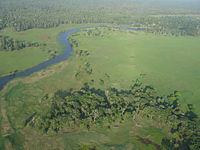List of World Heritage Sites in Papua New Guinea

The United Nations Educational, Scientific and Cultural Organization (UNESCO) World Heritage Sites are places of importance to cultural or natural heritage as described in the UNESCO World Heritage Convention, established in 1972.[1] Papua New Guinea accepted the convention on July 28, 1997, making its historical sites eligible for inclusion on the list. As of 2023, Papua New Guinea has only one World Heritage Site [2]
Location of sites[edit]
List of sites[edit]
| Name | Image | Location | Criteria | Year | Description |
|---|---|---|---|---|---|
| Kuk Early Agricultural Site | 
|
Western Highlands Province | Cultural (iii) (iv) | 2008 | Kuk Early Agricultural Site consists of 116 ha of swamps in the western highlands of New Guinea 1,500 metres above sea-level. Archaeological excavation has revealed the landscape to be one of wetland reclamation worked almost continuously for 7,000, and possibly for 10,000 years. It contains well-preserved archaeological remains demonstrating the technological leap which transformed plant exploitation to agriculture around 6,500 years ago. It is an excellent example of transformation of agricultural practices over time, from cultivation mounds to draining the wetlands through the digging of ditches with wooden tools. Kuk is one of the few places in the world where archaeological evidence suggests independent agricultural development and changes in agricultural practice over such a long period of time.[3] |
Tentative List[edit]
| Site | Image | Location | Criteria | Area ha (acre) |
Year of submission | Description |
|---|---|---|---|---|---|---|
| Huon Terraces - Stairway to the Past | Morone | Mixed (iii)(v)(vii)(viii)(ix)(x) | 2006 | [4] | ||
| Kikori River Basin / Great Papuan Plateau | Gulf, Southern Highlands, Western Highlands | Mixed (iii)(iv)(v)(vii)(viii)(ix)(x) | 2006 | [5] | ||
| Kokoda Track and Owen Stanley Ranges | 
|
Central, Southern Highlands | Mixed (iii)(v)(vi)(vii)(x) | 2006 | [6] | |
| Milne Bay Seascape (Pacific Jewels of Marine Biodiversity) | 
|
Milne Bay | Mixed (iii)(v)(vii)(viii)(ix)(x) | 2006 | [7] | |
| The Sublime Karsts of Papua New Guinea | East New Britain,Southern Highlands,Western | Mixed (v)(vii)(viii)(ix)(x) | 2006 | [8] | ||
| Trans-Fly Complex | 
|
Western | Mixed (v)(vi)(x) | 2006 | [9] | |
| Upper Sepik River Basin | 
|
East Sepik, West Sepik | Mixed (i)(iii)(iv)(v)(vii)(viii)(ix)(x) | 2006 | [10] |
References[edit]
- ^ "The World Heritage Convention". UNESCO. Retrieved December 11, 2023.
- ^ "Papua New Guinea". UNESCO. Retrieved November 20, 2023.
- ^ "Levuka Historical Port Town". UNESCO World Heritage Centre. Retrieved 2023-11-20.
 Text was copied from this source, which is available under a Creative Commons Attribution 3.0 IGO (CC BY 3.0 IGO) license.
Text was copied from this source, which is available under a Creative Commons Attribution 3.0 IGO (CC BY 3.0 IGO) license.
- ^ "Huon Terraces - Stairway to the Past". UNESCO World Heritage Centre. Retrieved 2023-12-30.
- ^ "Kikori River Basin / Great Papuan Plateau". UNESCO World Heritage Centre. Retrieved 2023-12-30.
- ^ "Kokoda Track and Owen Stanley Ranges". UNESCO World Heritage Centre. Retrieved 2023-12-30.
- ^ "Milne Bay Seascape (Pacific Jewels of Marine Biodiversity)". UNESCO World Heritage Centre. Retrieved 2023-12-30.
- ^ "The Sublime Karsts of Papua New Guinea". UNESCO World Heritage Centre. Retrieved 2023-12-30.
- ^ "Trans-Fly Complex". UNESCO World Heritage Centre. Retrieved 2023-12-30.
- ^ "Upper Sepik River Basin". UNESCO World Heritage Centre. Retrieved 2023-12-30.






